高中英语语法复习时态和语态课件(18张PPT)
文档属性
| 名称 | 高中英语语法复习时态和语态课件(18张PPT) |  | |
| 格式 | zip | ||
| 文件大小 | 97.5KB | ||
| 资源类型 | 教案 | ||
| 版本资源 | 人教版(2019) | ||
| 科目 | 英语 | ||
| 更新时间 | 2022-01-20 09:15:11 | ||
图片预览

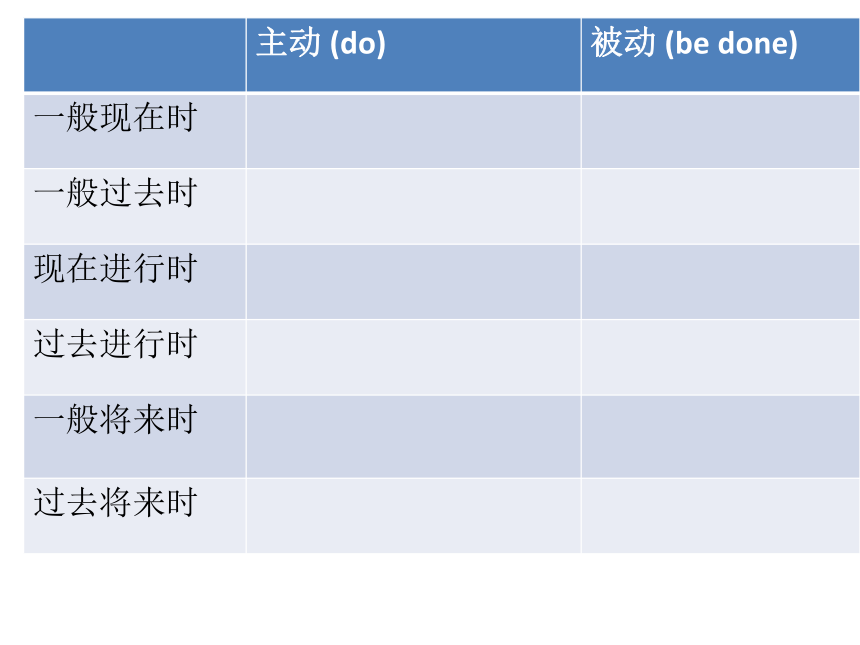
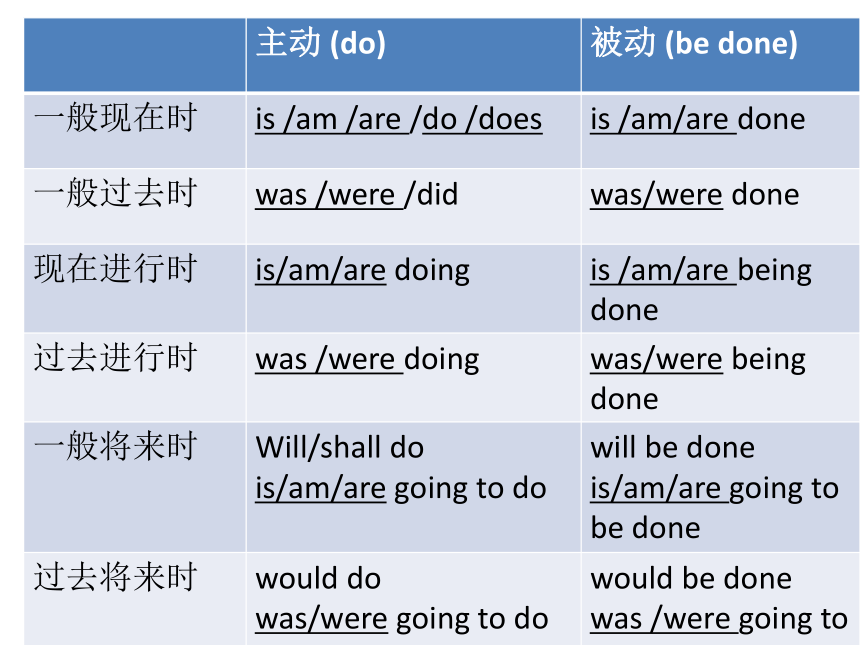
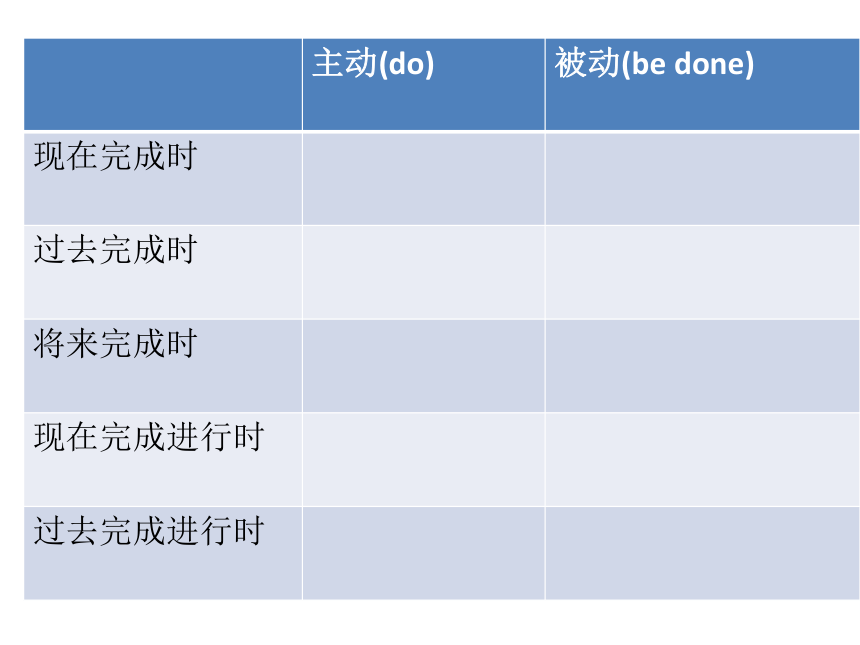
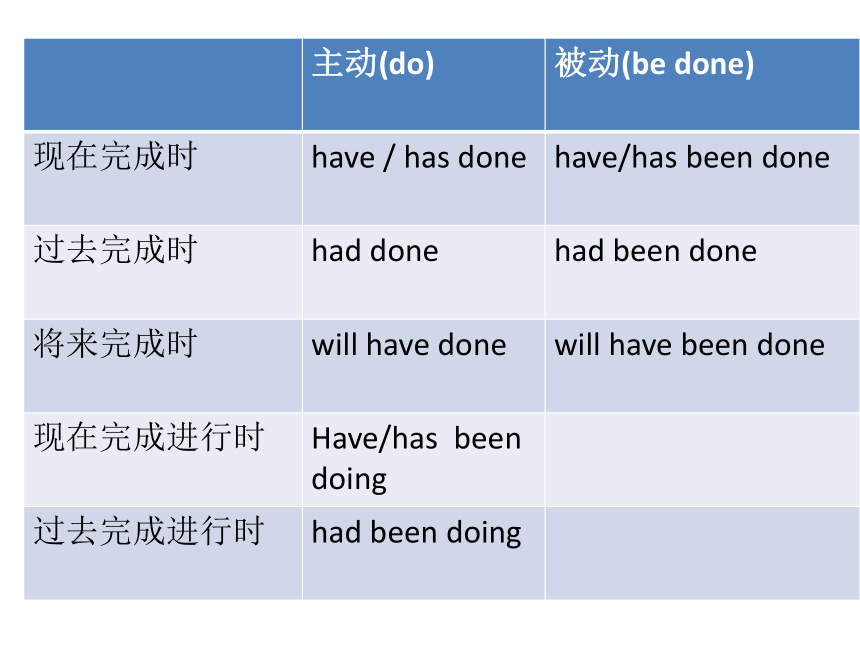
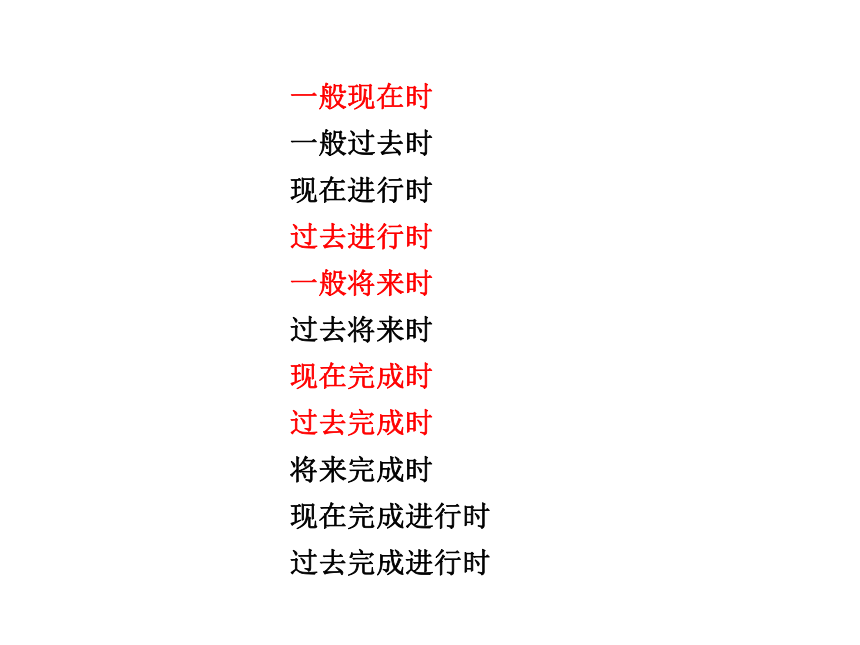
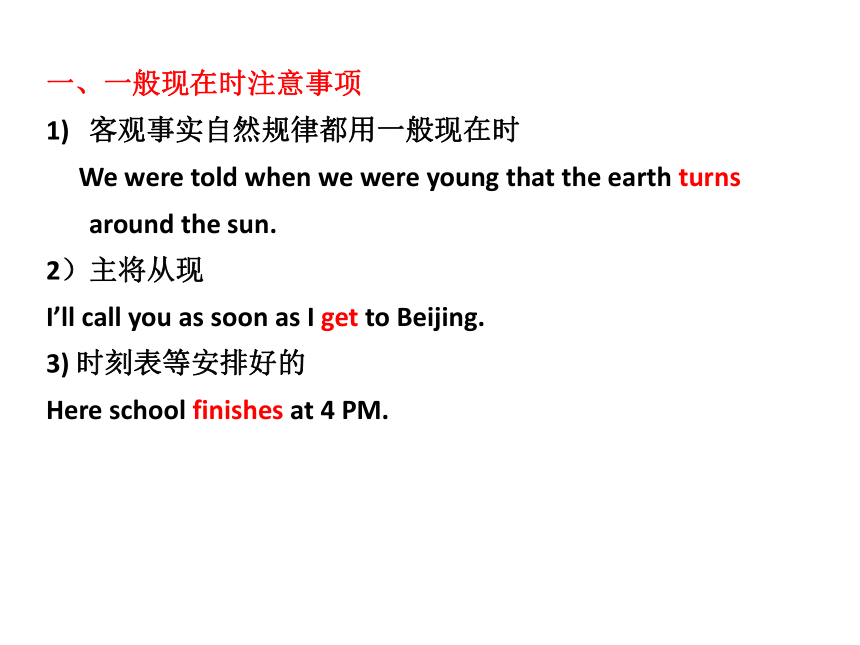
文档简介
(共18张PPT)
时态&语态
主动 (do) 被动 (be done)
一般现在时
一般过去时
现在进行时
过去进行时
一般将来时
过去将来时
主动 (do) 被动 (be done)
一般现在时 is /am /are /do /does is /am/are done
一般过去时 was /were /did was/were done
现在进行时 is/am/are doing is /am/are being done
过去进行时 was /were doing was/were being done
一般将来时 Will/shall do is/am/are going to do will be done
is/am/are going to be done
过去将来时 would do was/were going to do would be done
was /were going to be done
主动(do) 被动(be done)
现在完成时
过去完成时
将来完成时
现在完成进行时
过去完成进行时
主动(do) 被动(be done)
现在完成时 have / has done have/has been done
过去完成时 had done had been done
将来完成时 will have done will have been done
现在完成进行时 Have/has been doing
过去完成进行时 had been doing
一般现在时
一般过去时
现在进行时
过去进行时
一般将来时
过去将来时
现在完成时
过去完成时
将来完成时
现在完成进行时
过去完成进行时
一、一般现在时注意事项
客观事实自然规律都用一般现在时
We were told when we were young that the earth turns around the sun.
2)主将从现
I’ll call you as soon as I get to Beijing.
3) 时刻表等安排好的
Here school finishes at 4 PM.
二、过去进行时重要句型
I was cooking when someone knocked at the door. 我正在做饭,这时有人敲门。
三、一般将来时几种形式的区别
1) will/shall do 客观将来; 表示“愿意”“承诺”
I will be 18 next year.
I will help you to improve your English
2) be going to do 主观将来;打算;迹象表明
We are going to have a meeting this afternoon.
Look at these black clouds. It is going to rain.
3) be to do 表按计划安排即将发生的动作
We are to discuss the report next Saturday.
4) be about to do 表马上/迫在眉睫做某事 (不和时间状语连用)
He is about to leave for Beijing.
5) be doing 用现在进行时表现计划安排即将发生的动作,多用于come, go , arrive, leave, fly 等表示位置转移的动词。
I am arriving.
过去将来时同样适用
She said she would be 18 the next year.
Our teacher told us we were going to have a meeting this afternoon.
He was about to leave when it suddenly began to rain.
四、现在进行时特殊用法
1) be always / constantly doing 说话人带有赞美厌烦等感彩
He is always helping others.
She is constantly talking behind others’ back.
You are always making such foolish mistakes.
2) be doing 用现在进行时表现计划安排即将发生的动作,多用于come, go , arrive, leave, fly 等表示位置转移的动词。
I am arriving.
五、现在完成时和一般过去时区别
一般过去时仅表示过去发生的动作;现在完成时表示过去的动作对现在的影响。
He left here yesterday morning.
He has already left here. (现在不在这儿)
六、现在完成时重点句型
1)We have known each other since I came here.
We have known each other for 10 years. / since ten years ago.
2)He has been abroad many times.
3)It is the first time that I have visited the place.
4)This is the most beautiful house that I have ever seen.
七、现在完成时和现在完成进行时区别
现在完成时 1)过去的动作对现在的影响。2)过去发生的动作或开始的状态一直持续到现在,并有可能继续下去。
He has left his hometown.
He has worked in our company for 30 years.
She has been busy since last week.
现在完成进行时 过去某时开始的动作一直持续到现在,说话时这个动作正在进行且可以持续下去。或者说话时动作刚刚结束。
She is very tired. She has been working all morning.
He has been working in our company for 30 years.
过去发生的动作对现在的影响 过去发生的动作一直持续到现在,并有可能继续下去。 过去 开始的状态一直持续到现在,并有可能继续下去。
现在完成时 √ √ √
现在完成进行时 √
现在完成时和现在完成进行时区别 一
现在完成时和现在完成进行时区别二:时间状语
现在完成时: since, for, recently, lately, already, yet, just, ever, never, so far, before, in the post/last years,three times
现在完成进行时:for, since, all morning, all day, recently, lately
八、过去完成时重点句型 (特点:过去的过去)
1) I had already finished my homework before my Mom came back.
2)We had already finished the work by nine o’clock yesterday.
We had already finished the work by the end of last month.
We had already finished the work by the time my Mom came back.
3)No sooner had he reached home than it began to rain.
Hardly had I got on the train when the train started out.
4)He had meant to see me off at the airport, but he got there too late. (表示过去未曾实现的愿望打算意图,常用动词hope, intend, mean, plan 等)
九、by / by the end of / by the time… 句型中的完成时
We had learned 5 units by the end of last week.
We will have learned 6 units by the end of next week.
I will have finished the cleaning by the time my husband comes back.
总结:by…过去时间, 用过去完成时;by…将来时间, 用将来完成时
时态&语态
主动 (do) 被动 (be done)
一般现在时
一般过去时
现在进行时
过去进行时
一般将来时
过去将来时
主动 (do) 被动 (be done)
一般现在时 is /am /are /do /does is /am/are done
一般过去时 was /were /did was/were done
现在进行时 is/am/are doing is /am/are being done
过去进行时 was /were doing was/were being done
一般将来时 Will/shall do is/am/are going to do will be done
is/am/are going to be done
过去将来时 would do was/were going to do would be done
was /were going to be done
主动(do) 被动(be done)
现在完成时
过去完成时
将来完成时
现在完成进行时
过去完成进行时
主动(do) 被动(be done)
现在完成时 have / has done have/has been done
过去完成时 had done had been done
将来完成时 will have done will have been done
现在完成进行时 Have/has been doing
过去完成进行时 had been doing
一般现在时
一般过去时
现在进行时
过去进行时
一般将来时
过去将来时
现在完成时
过去完成时
将来完成时
现在完成进行时
过去完成进行时
一、一般现在时注意事项
客观事实自然规律都用一般现在时
We were told when we were young that the earth turns around the sun.
2)主将从现
I’ll call you as soon as I get to Beijing.
3) 时刻表等安排好的
Here school finishes at 4 PM.
二、过去进行时重要句型
I was cooking when someone knocked at the door. 我正在做饭,这时有人敲门。
三、一般将来时几种形式的区别
1) will/shall do 客观将来; 表示“愿意”“承诺”
I will be 18 next year.
I will help you to improve your English
2) be going to do 主观将来;打算;迹象表明
We are going to have a meeting this afternoon.
Look at these black clouds. It is going to rain.
3) be to do 表按计划安排即将发生的动作
We are to discuss the report next Saturday.
4) be about to do 表马上/迫在眉睫做某事 (不和时间状语连用)
He is about to leave for Beijing.
5) be doing 用现在进行时表现计划安排即将发生的动作,多用于come, go , arrive, leave, fly 等表示位置转移的动词。
I am arriving.
过去将来时同样适用
She said she would be 18 the next year.
Our teacher told us we were going to have a meeting this afternoon.
He was about to leave when it suddenly began to rain.
四、现在进行时特殊用法
1) be always / constantly doing 说话人带有赞美厌烦等感彩
He is always helping others.
She is constantly talking behind others’ back.
You are always making such foolish mistakes.
2) be doing 用现在进行时表现计划安排即将发生的动作,多用于come, go , arrive, leave, fly 等表示位置转移的动词。
I am arriving.
五、现在完成时和一般过去时区别
一般过去时仅表示过去发生的动作;现在完成时表示过去的动作对现在的影响。
He left here yesterday morning.
He has already left here. (现在不在这儿)
六、现在完成时重点句型
1)We have known each other since I came here.
We have known each other for 10 years. / since ten years ago.
2)He has been abroad many times.
3)It is the first time that I have visited the place.
4)This is the most beautiful house that I have ever seen.
七、现在完成时和现在完成进行时区别
现在完成时 1)过去的动作对现在的影响。2)过去发生的动作或开始的状态一直持续到现在,并有可能继续下去。
He has left his hometown.
He has worked in our company for 30 years.
She has been busy since last week.
现在完成进行时 过去某时开始的动作一直持续到现在,说话时这个动作正在进行且可以持续下去。或者说话时动作刚刚结束。
She is very tired. She has been working all morning.
He has been working in our company for 30 years.
过去发生的动作对现在的影响 过去发生的动作一直持续到现在,并有可能继续下去。 过去 开始的状态一直持续到现在,并有可能继续下去。
现在完成时 √ √ √
现在完成进行时 √
现在完成时和现在完成进行时区别 一
现在完成时和现在完成进行时区别二:时间状语
现在完成时: since, for, recently, lately, already, yet, just, ever, never, so far, before, in the post/last years,three times
现在完成进行时:for, since, all morning, all day, recently, lately
八、过去完成时重点句型 (特点:过去的过去)
1) I had already finished my homework before my Mom came back.
2)We had already finished the work by nine o’clock yesterday.
We had already finished the work by the end of last month.
We had already finished the work by the time my Mom came back.
3)No sooner had he reached home than it began to rain.
Hardly had I got on the train when the train started out.
4)He had meant to see me off at the airport, but he got there too late. (表示过去未曾实现的愿望打算意图,常用动词hope, intend, mean, plan 等)
九、by / by the end of / by the time… 句型中的完成时
We had learned 5 units by the end of last week.
We will have learned 6 units by the end of next week.
I will have finished the cleaning by the time my husband comes back.
总结:by…过去时间, 用过去完成时;by…将来时间, 用将来完成时
